Page 1396 of 3419
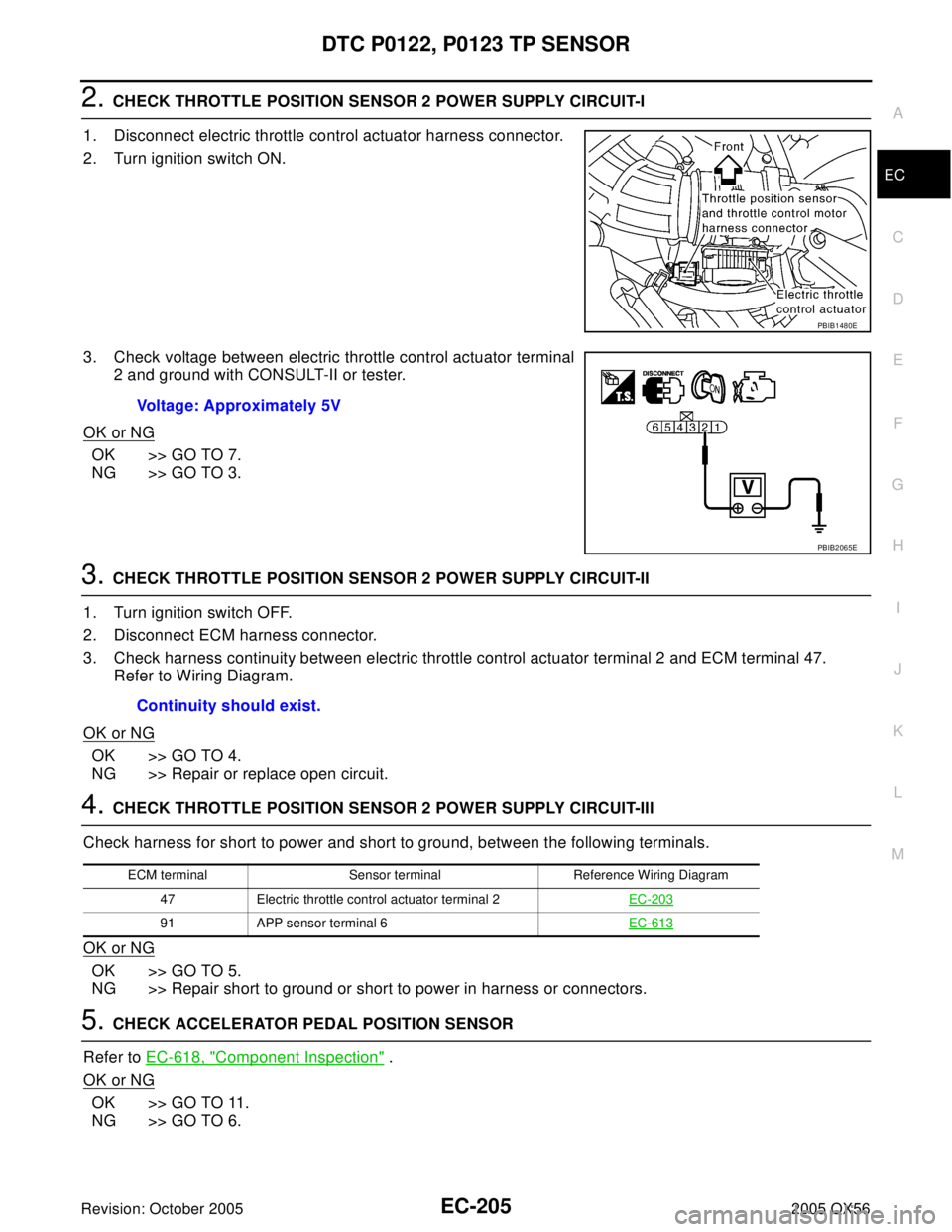
DTC P0122, P0123 TP SENSOR
EC-205
C
D
E
F
G
H
I
J
K
L
MA
EC
Revision: October 20052005 QX56
2. CHECK THROTTLE POSITION SENSOR 2 POWER SUPPLY CIRCUIT-I
1. Disconnect electric throttle control actuator harness connector.
2. Turn ignition switch ON.
3. Check voltage between electric throttle control actuator terminal
2 and ground with CONSULT-II or tester.
OK or NG
OK >> GO TO 7.
NG >> GO TO 3.
3. CHECK THROTTLE POSITION SENSOR 2 POWER SUPPLY CIRCUIT-II
1. Turn ignition switch OFF.
2. Disconnect ECM harness connector.
3. Check harness continuity between electric throttle control actuator terminal 2 and ECM terminal 47.
Refer to Wiring Diagram.
OK or NG
OK >> GO TO 4.
NG >> Repair or replace open circuit.
4. CHECK THROTTLE POSITION SENSOR 2 POWER SUPPLY CIRCUIT-III
Check harness for short to power and short to ground, between the following terminals.
OK or NG
OK >> GO TO 5.
NG >> Repair short to ground or short to power in harness or connectors.
5. CHECK ACCELERATOR PEDAL POSITION SENSOR
Refer to EC-618, "
Component Inspection" .
OK or NG
OK >> GO TO 11.
NG >> GO TO 6.
PBIB1480E
Voltage: Approximately 5V
PBIB2065E
Continuity should exist.
ECM terminal Sensor terminal Reference Wiring Diagram
47 Electric throttle control actuator terminal 2EC-203
91 APP sensor terminal 6EC-613
Page 1397 of 3419
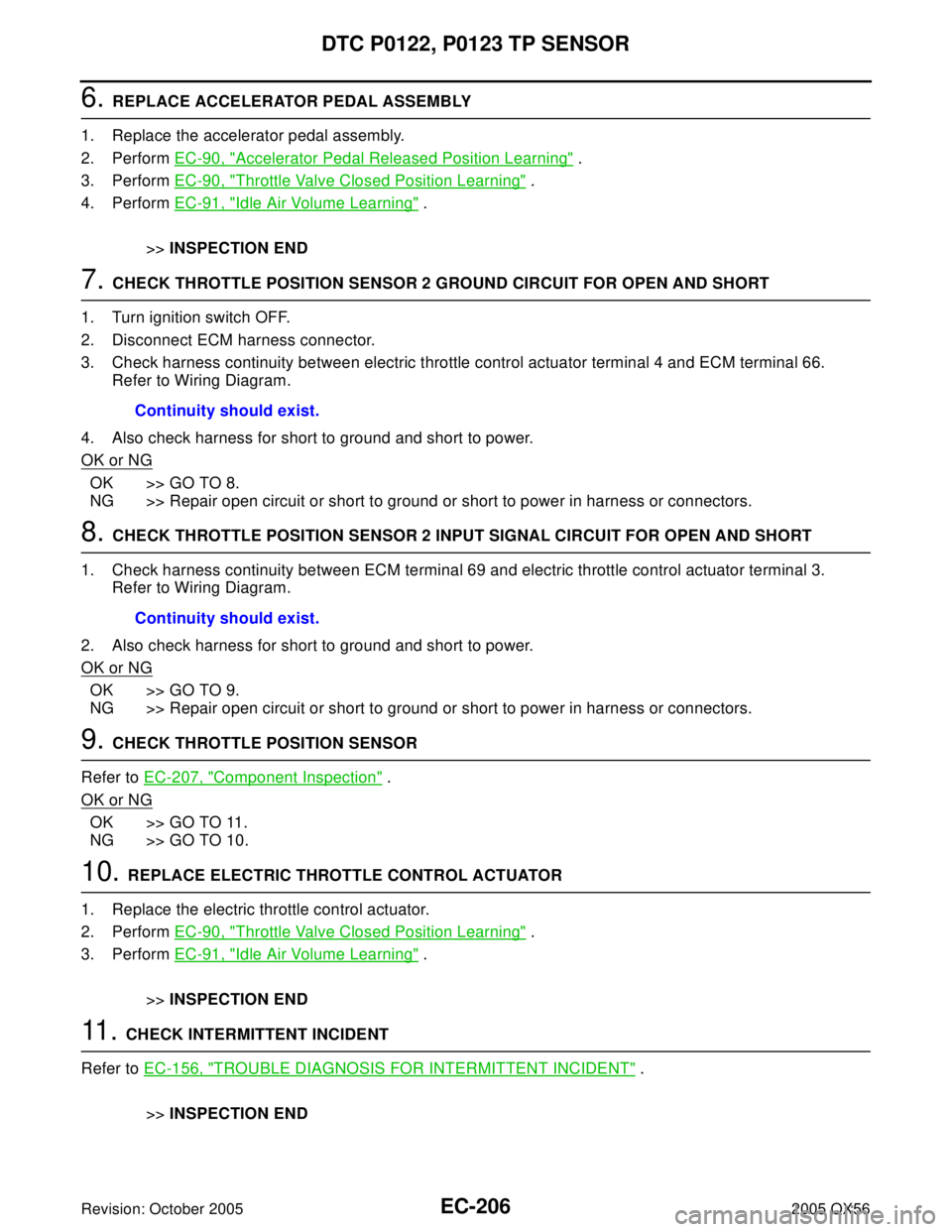
EC-206Revision: October 2005
DTC P0122, P0123 TP SENSOR
2005 QX56
6. REPLACE ACCELERATOR PEDAL ASSEMBLY
1. Replace the accelerator pedal assembly.
2. Perform EC-90, "
Accelerator Pedal Released Position Learning" .
3. Perform EC-90, "
Throttle Valve Closed Position Learning" .
4. Perform EC-91, "
Idle Air Volume Learning" .
>>INSPECTION END
7. CHECK THROTTLE POSITION SENSOR 2 GROUND CIRCUIT FOR OPEN AND SHORT
1. Turn ignition switch OFF.
2. Disconnect ECM harness connector.
3. Check harness continuity between electric throttle control actuator terminal 4 and ECM terminal 66.
Refer to Wiring Diagram.
4. Also check harness for short to ground and short to power.
OK or NG
OK >> GO TO 8.
NG >> Repair open circuit or short to ground or short to power in harness or connectors.
8. CHECK THROTTLE POSITION SENSOR 2 INPUT SIGNAL CIRCUIT FOR OPEN AND SHORT
1. Check harness continuity between ECM terminal 69 and electric throttle control actuator terminal 3.
Refer to Wiring Diagram.
2. Also check harness for short to ground and short to power.
OK or NG
OK >> GO TO 9.
NG >> Repair open circuit or short to ground or short to power in harness or connectors.
9. CHECK THROTTLE POSITION SENSOR
Refer to EC-207, "
Component Inspection" .
OK or NG
OK >> GO TO 11.
NG >> GO TO 10.
10. REPLACE ELECTRIC THROTTLE CONTROL ACTUATOR
1. Replace the electric throttle control actuator.
2. Perform EC-90, "
Throttle Valve Closed Position Learning" .
3. Perform EC-91, "
Idle Air Volume Learning" .
>>INSPECTION END
11 . CHECK INTERMITTENT INCIDENT
Refer to EC-156, "
TROUBLE DIAGNOSIS FOR INTERMITTENT INCIDENT" .
>>INSPECTION END Continuity should exist.
Continuity should exist.
Page 1398 of 3419
DTC P0122, P0123 TP SENSOR
EC-207
C
D
E
F
G
H
I
J
K
L
MA
EC
Revision: October 20052005 QX56
Component InspectionUBS00H1W
THROTTLE POSITION SENSOR
1. Reconnect all harness connectors disconnected.
2. Perform EC-90, "
Throttle Valve Closed Position Learning" .
3. Turn ignition switch ON.
4. Set selector lever to D position.
5. Check voltage between ECM terminals 50 (TP sensor 1 signal),
69 (TP sensor 2 signal) and ground under the following condi-
tions.
6. If NG, replace electric throttle control actuator and go to the next
step.
7. Perform EC-90, "
Throttle Valve Closed Position Learning" .
8. Perform EC-91, "
Idle Air Volume Learning" .
Removal and InstallationUBS00H1X
ELECTRIC THROTTLE CONTROL ACTUATOR
Refer to EM-15, "INTAKE MANIFOLD" .
Terminal Accelerator pedal Voltage
50
(Throttle position sensor 1)Fully released More than 0.36V
Fully depressed Less than 4.75V
69
(Throttle position sensor 2)Fully released Less than 4.75V
Fully depressed More than 0.36V
PBIB1530E
Page 1399 of 3419
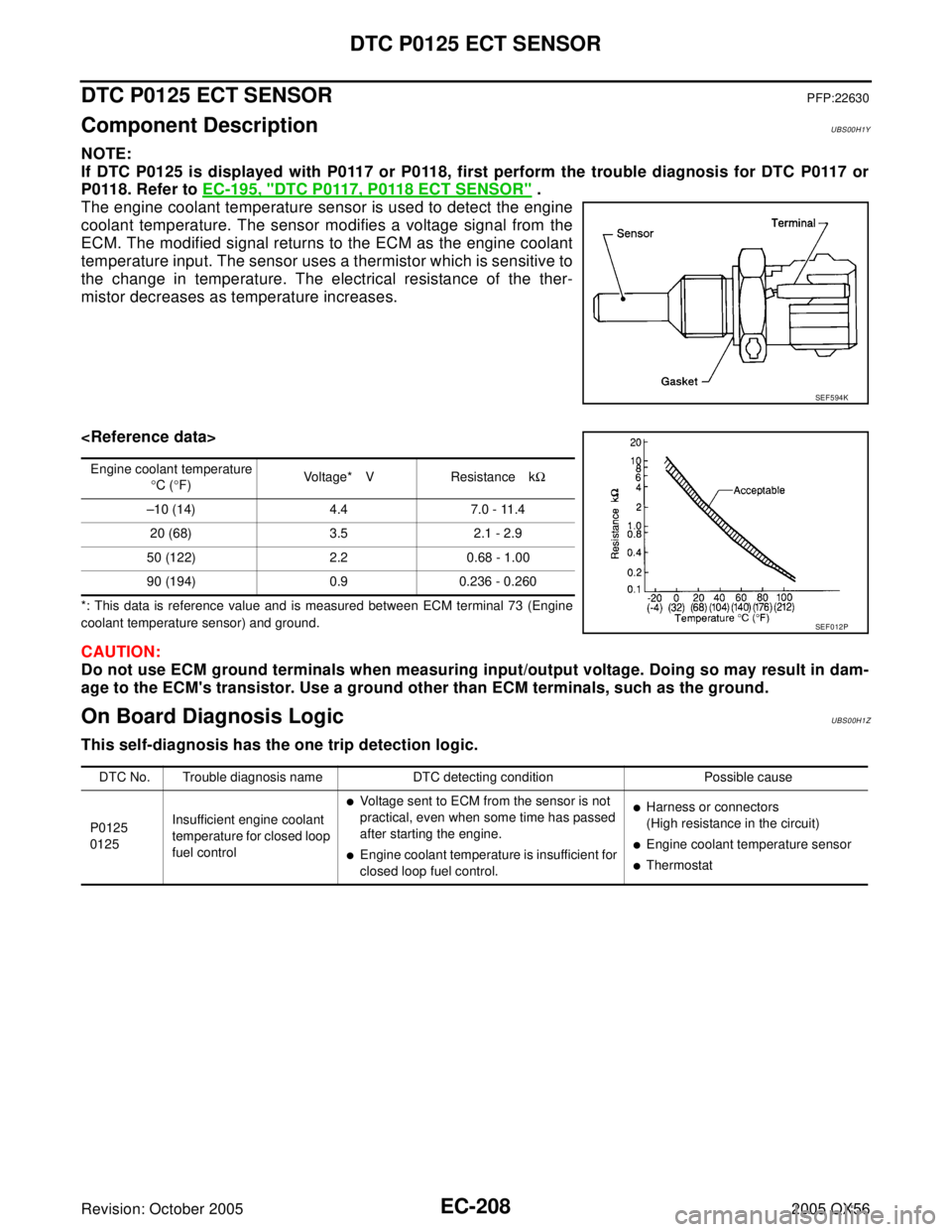
EC-208Revision: October 2005
DTC P0125 ECT SENSOR
2005 QX56
DTC P0125 ECT SENSORPFP:22630
Component DescriptionUBS00H1Y
NOTE:
If DTC P0125 is displayed with P0117 or P0118, first perform the trouble diagnosis for DTC P0117 or
P0118. Refer to EC-195, "
DTC P0117, P0118 ECT SENSOR" .
The engine coolant temperature sensor is used to detect the engine
coolant temperature. The sensor modifies a voltage signal from the
ECM. The modified signal returns to the ECM as the engine coolant
temperature input. The sensor uses a thermistor which is sensitive to
the change in temperature. The electrical resistance of the ther-
mistor decreases as temperature increases.
*: This data is reference value and is measured between ECM terminal 73 (Engine
coolant temperature sensor) and ground.
CAUTION:
Do not use ECM ground terminals when measuring input/output voltage. Doing so may result in dam-
age to the ECM's transistor. Use a ground other than ECM terminals, such as the ground.
On Board Diagnosis LogicUBS00H1Z
This self-diagnosis has the one trip detection logic.
SEF 5 94 K
Engine coolant temperature
°C (°F)Voltage* V Resistance kΩ
–10 (14) 4.4 7.0 - 11.4
20 (68) 3.5 2.1 - 2.9
50 (122) 2.2 0.68 - 1.00
90 (194) 0.9 0.236 - 0.260
SEF 0 12 P
DTC No. Trouble diagnosis name DTC detecting condition Possible cause
P0125
0125Insufficient engine coolant
temperature for closed loop
fuel control
�Voltage sent to ECM from the sensor is not
practical, even when some time has passed
after starting the engine.
�Engine coolant temperature is insufficient for
closed loop fuel control.
�Harness or connectors
(High resistance in the circuit)
�Engine coolant temperature sensor
�Thermostat
Page 1400 of 3419
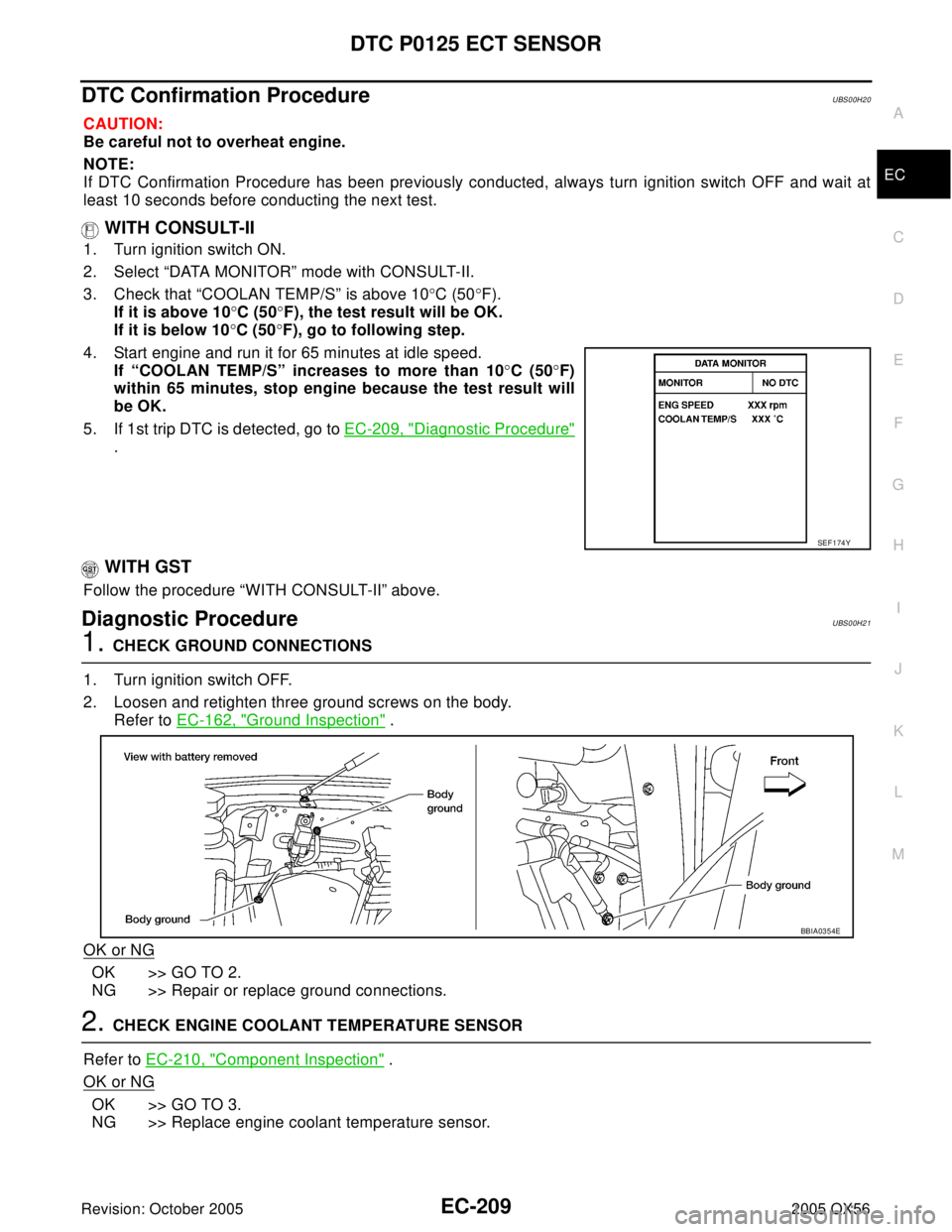
DTC P0125 ECT SENSOR
EC-209
C
D
E
F
G
H
I
J
K
L
MA
EC
Revision: October 20052005 QX56
DTC Confirmation ProcedureUBS00H20
CAUTION:
Be careful not to overheat engine.
NOTE:
If DTC Confirmation Procedure has been previously conducted, always turn ignition switch OFF and wait at
least 10 seconds before conducting the next test.
WITH CONSULT-II
1. Turn ignition switch ON.
2. Select “DATA MONITOR” mode with CONSULT-II.
3. Check that “COOLAN TEMP/S” is above 10°C (50°F).
If it is above 10°C (50°F), the test result will be OK.
If it is below 10°C (50°F), go to following step.
4. Start engine and run it for 65 minutes at idle speed.
If “COOLAN TEMP/S” increases to more than 10°C (50°F)
within 65 minutes, stop engine because the test result will
be OK.
5. If 1st trip DTC is detected, go to EC-209, "
Diagnostic Procedure"
.
WITH GST
Follow the procedure “WITH CONSULT-II” above.
Diagnostic ProcedureUBS00H21
1. CHECK GROUND CONNECTIONS
1. Turn ignition switch OFF.
2. Loosen and retighten three ground screws on the body.
Refer to EC-162, "
Ground Inspection" .
OK or NG
OK >> GO TO 2.
NG >> Repair or replace ground connections.
2. CHECK ENGINE COOLANT TEMPERATURE SENSOR
Refer to EC-210, "
Component Inspection" .
OK or NG
OK >> GO TO 3.
NG >> Replace engine coolant temperature sensor.
SEF 1 74 Y
BBIA0354E
Page 1401 of 3419
EC-210Revision: October 2005
DTC P0125 ECT SENSOR
2005 QX56
3. CHECK THERMOSTAT OPERATION
When the engine is cold [lower than 70°C (158°F)] condition, grasp lower radiator hose and confirm the engine
coolant does not flow.
OK or NG
OK >> GO TO 4.
NG >> Repair or replace thermostat. Refer to CO-19, "
THERMOSTAT AND WATER PIPING" .
4. CHECK INTERMITTENT INCIDENT
Refer to EC-156, "
TROUBLE DIAGNOSIS FOR INTERMITTENT INCIDENT" .
Refer to EC-197, "
Wiring Diagram" .
>>INSPECTION END
Component InspectionUBS00H22
ENGINE COOLANT TEMPERATURE SENSOR
1. Check resistance between engine coolant temperature sensor
terminals 1 and 2 as shown in the figure.
2. If NG, replace engine coolant temperature sensor.
Removal and InstallationUBS00H23
ENGINE COOLANT TEMPERATURE SENSOR
Refer to CO-19, "THERMOSTAT AND WATER PIPING" .
PBIB2005E
Engine coolant temperature°C (°F) Resistance kΩ
20 (68) 2.1 - 2.9
50 (122) 0.68 - 1.00
90 (194) 0.236 - 0.260
SEF 0 12 P
Page 1402 of 3419
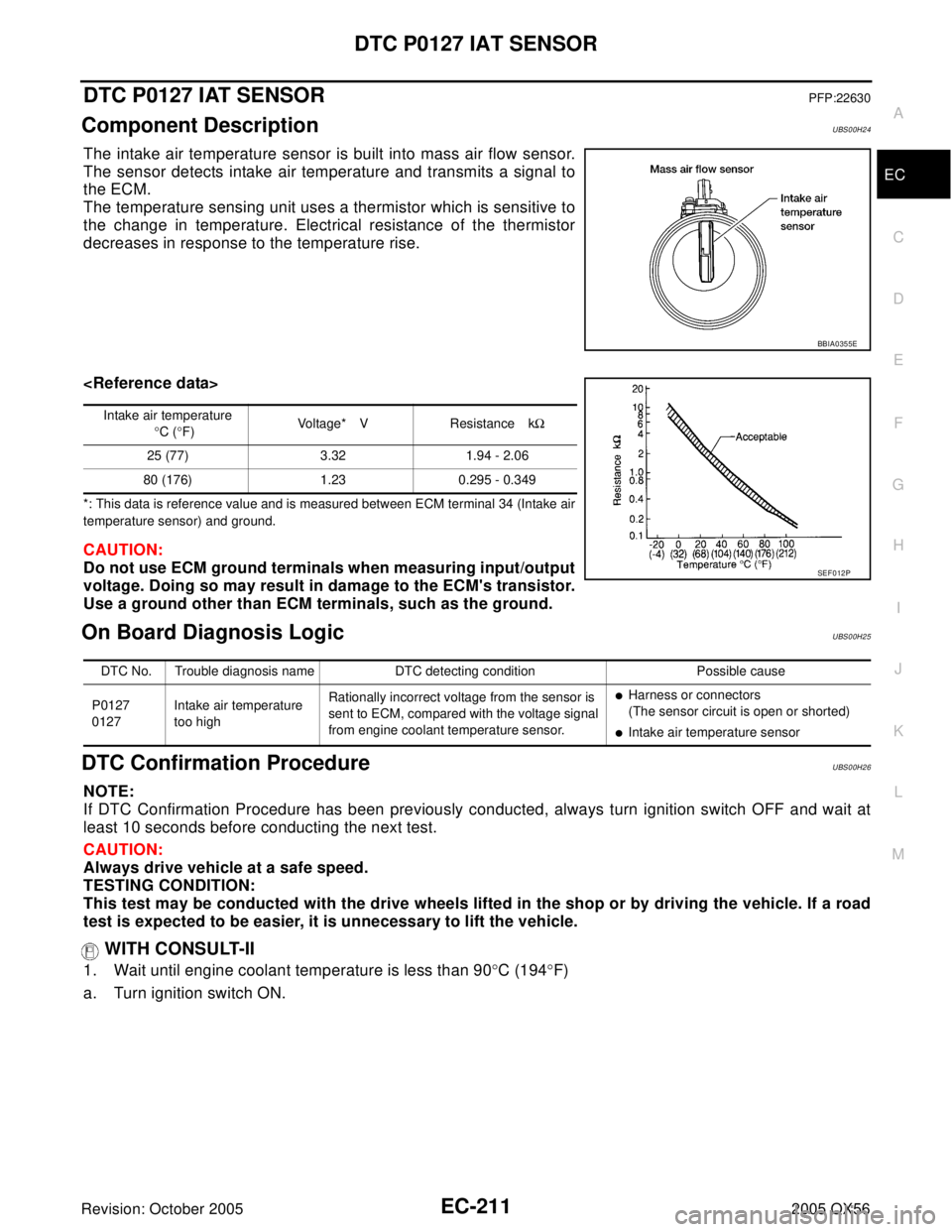
DTC P0127 IAT SENSOR
EC-211
C
D
E
F
G
H
I
J
K
L
MA
EC
Revision: October 20052005 QX56
DTC P0127 IAT SENSORPFP:22630
Component DescriptionUBS00H24
The intake air temperature sensor is built into mass air flow sensor.
The sensor detects intake air temperature and transmits a signal to
the ECM.
The temperature sensing unit uses a thermistor which is sensitive to
the change in temperature. Electrical resistance of the thermistor
decreases in response to the temperature rise.
*: This data is reference value and is measured between ECM terminal 34 (Intake air
temperature sensor) and ground.
CAUTION:
Do not use ECM ground terminals when measuring input/output
voltage. Doing so may result in damage to the ECM's transistor.
Use a ground other than ECM terminals, such as the ground.
On Board Diagnosis LogicUBS00H25
DTC Confirmation ProcedureUBS00H26
NOTE:
If DTC Confirmation Procedure has been previously conducted, always turn ignition switch OFF and wait at
least 10 seconds before conducting the next test.
CAUTION:
Always drive vehicle at a safe speed.
TESTING CONDITION:
This test may be conducted with the drive wheels lifted in the shop or by driving the vehicle. If a road
test is expected to be easier, it is unnecessary to lift the vehicle.
WITH CONSULT-II
1. Wait until engine coolant temperature is less than 90°C (194°F)
a. Turn ignition switch ON.
BBIA0355E
Intake air temperature
°C (°F)Voltage* V Resistance kΩ
25 (77) 3.32 1.94 - 2.06
80 (176) 1.23 0.295 - 0.349
SEF 0 12 P
DTC No. Trouble diagnosis name DTC detecting condition Possible cause
P0127
0127Intake air temperature
too highRationally incorrect voltage from the sensor is
sent to ECM, compared with the voltage signal
from engine coolant temperature sensor.
�Harness or connectors
(The sensor circuit is open or shorted)
�Intake air temperature sensor
Page 1403 of 3419
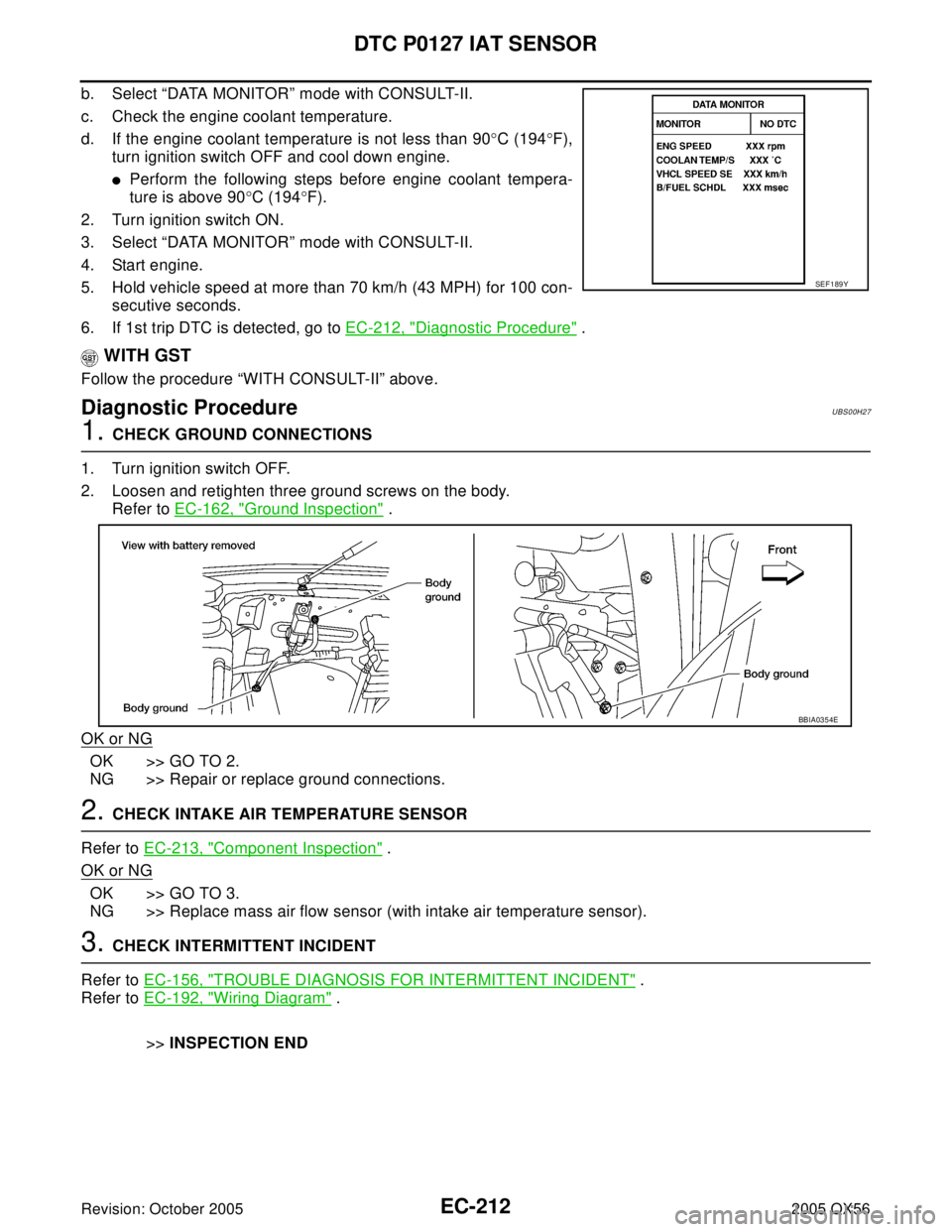
EC-212Revision: October 2005
DTC P0127 IAT SENSOR
2005 QX56
b. Select “DATA MONITOR” mode with CONSULT-II.
c. Check the engine coolant temperature.
d. If the engine coolant temperature is not less than 90°C (194°F),
turn ignition switch OFF and cool down engine.
�Perform the following steps before engine coolant tempera-
ture is above 90°C (194°F).
2. Turn ignition switch ON.
3. Select “DATA MONITOR” mode with CONSULT-II.
4. Start engine.
5. Hold vehicle speed at more than 70 km/h (43 MPH) for 100 con-
secutive seconds.
6. If 1st trip DTC is detected, go to EC-212, "
Diagnostic Procedure" .
WITH GST
Follow the procedure “WITH CONSULT-II” above.
Diagnostic ProcedureUBS00H27
1. CHECK GROUND CONNECTIONS
1. Turn ignition switch OFF.
2. Loosen and retighten three ground screws on the body.
Refer to EC-162, "
Ground Inspection" .
OK or NG
OK >> GO TO 2.
NG >> Repair or replace ground connections.
2. CHECK INTAKE AIR TEMPERATURE SENSOR
Refer to EC-213, "
Component Inspection" .
OK or NG
OK >> GO TO 3.
NG >> Replace mass air flow sensor (with intake air temperature sensor).
3. CHECK INTERMITTENT INCIDENT
Refer to EC-156, "
TROUBLE DIAGNOSIS FOR INTERMITTENT INCIDENT" .
Refer to EC-192, "
Wiring Diagram" .
>>INSPECTION END
SEF 1 89 Y
BBIA0354E